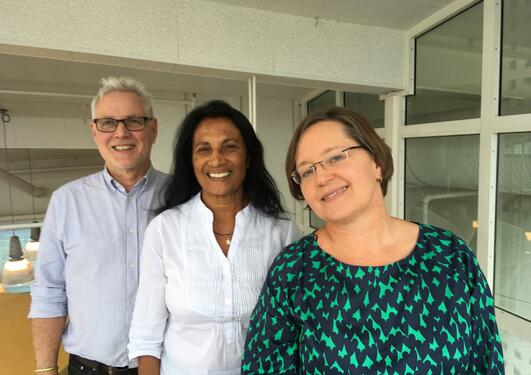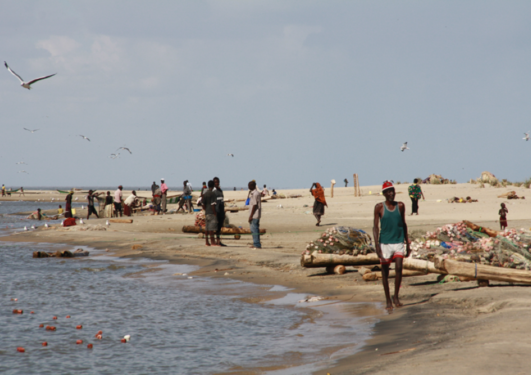Small fish may act as “vitamin sweets”
In the world today, malnutrition is a bigger problem than hunger. Researchers hope that a small freshwater fish may prove to be packed with important micronutrients.

Main content
Lake Victoria, Kenya, autumn 2019: Marian Kjellevold, a researcher at the Institute of Marine Research, can see antelopes, zebras and monkeys through the window as the car passes through the rolling savannah.
The classic road trip for tourists in East Africa, in other words.
But Marian and her travel companion, the German research scholar Laura Wessels, are not tourists – they’re researchers, and they’re here to study a small, but vital, freshwater fish.
Important food source for the many
The “Dagaa”, or Rastrineobola argentea for those who prefer Latin, is a vital small fish for many people who live around Lake Victoria.
A lot of the people in this region have a monotonous, plant-based diet. In many cases, meat and fish are unaffordable luxuries. But this small fish is cheaper.
“This isn’t a fish you’ll be served in a restaurant in Kenya. It’s small, so you can buy it in small quantities, and the price is so low that many people can buy a few of them, even if they can’t afford any other meat or fish”, says Kjellevold.
Analysing nutrients in the fish
At the moment, we know little about what nutrients the fish actually contains, or whether it contains unwanted substances such as toxins or heavy metals. That is where the researchers come in.
“Our job is to analyse the nutritional value of the fish, and to look for unwanted substances”, explains Kjellevold.
That can’t be done at the drop of a hat.
Measuring nutritional effect
The researchers bought fish at eight different markets, in three different towns: Kisumu, Nakuru and the capital Nairobi.
The capital is a long drive from the fishery in Lake Victoria – around 265 km from Kisumu and 135 km from Nakuru.
It was a deliberate decision to not just take samples from fish that hadn’t travelled far.
“The distance the fish travel may affect their nutritional value.”
In fact, the weather may also play a part.
“This fish is preserved by sun-drying. If it rains, could that affect its nutritional value?”
The researchers must also take into account seasonal variations. That’s why they’ll repeat the exercise of collecting samples several times over the course of the year. Their first trip was in the autumn of 2019, and this year they’ll be travelling back to Kenya to do it all again.
Samples analysed in Norway and Germany
Kjellevold and Wessels split each sample into two – 120 grams for Norway and 120 grams for Germany.
These were then sent to the researchers’ respective home countries for analysis. Marian Kjellevold is now waiting for the results, which will give us an idea of which vitamins and other nutrients are found in this popular fish.
“They are eaten whole, so I expect there to be a lot of micronutrients in each portion. But it will be exciting to find out, and even more exciting when we can compare the results with samples from further field trips. Then we’ll have a good idea of what the fish actually has to offer people – through the whole year.”
Food quality vs. food quantity
This fieldwork is part of the big, international project SmallFishFood, led by Professor Jeppe Kolding at the University of Bergen. As well as the Institute of Marine Research, the project partners include institutions in Uganda, Ghana, Kenya, Germany and the Netherlands.
Kolding believes that these small fish may prove to be important in the battle against malnutrition, which he recently documented in a UN report.
“In the old days, we just talked about food supply, because food was food. We didn’t give much importance to quality. But today obesity and malnutrition have become bigger problems, even in Africa. Now it’s important to look just as carefully at the quality of the food as at the quantity”, he says.
Fish as “vitamin sweets”
“Around half of all children in Africa suffer from malnutrition. That means they get too many empty calories, and too few micronutrients like calcium and iodine,” he says.
“Here in Norway parents give their children vitamin sweets. We believe this small fish can serve the same purpose, especially since they eat the whole fish including its head, skin and bones.”
Professor Kolding believes that small fish are an underappreciated food resource, also in Norway.
“We are trying to challenge the tradition of just eating nice fillets from big fish, because that means you miss out on lots of nutrients found in the head, bones and skin.
“And in this specific case, when we learn more about what nutrients this freshwater fish contains, we may be able to prevent malnutrition, by increasing the intake of a good source of nutrients like this,” says Jeppe Kolding.



